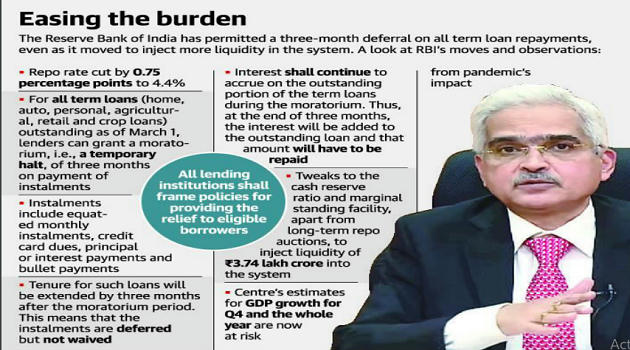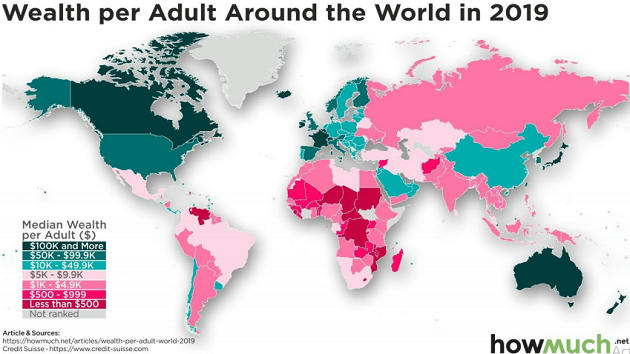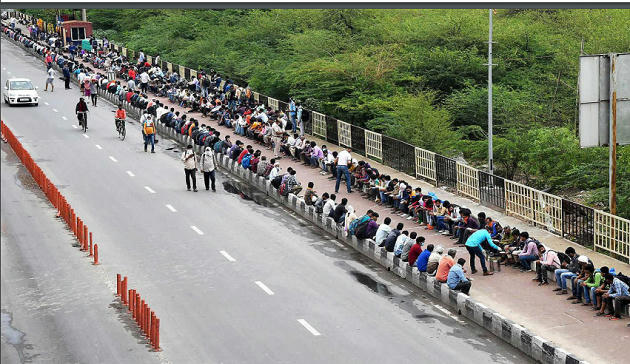Table of Contents
RBI’S GUNS BOOM
- RBI finally rolled out its big guns to fight the effects of the coronavirus on the financial system.
- Businesses were clamouring for relief.
- Governor Shaktikanta Das’s measures address the crucial factor of sustaining system liquidity while offering palliatives to individuals and businesses.
- There is no certainty over how long this uncertainty will prolong. Announcements by both RBI Gov and FinMin can only be the initial steps needed to protect the economy.
- There will be more to do as the crisis evolves; governments and regulators are reacting to events, as opposed to being proactive, simply because this is a kind of crisis that they have not dealt with before.
- Existing borrowers will benefit assuming that banks pass on the cut quickly — it is hoped that they really do so — but there is going to be nothing like the cut spurring fresh investment, which will be the last thing on the minds of businessmen.
- The sum total of new long-term repo operations of ₹1-lakh crore, and ₹1.37-lakh crore each from the cut in cash reserve ratio and increase in marginal standing facility (overnight borrowings by banks from the RBI) adds up to a very significant ₹3.74-lakh crore.
- Together with the ₹2.8-lakh crore pumped in through various market interventions since February, the RBI’s liquidity injection amounts to a whopping 3.4% of GDP.
- To be sure, there will be consequences of heightened liquidity but that is a problem for another day.
- The priority is to keep the system lubricated.
- The moratorium on term loans and deferment of interest on working capital loans will reduce anxiety among businesses and individuals who will see a fall in income/cash flows.
- In sum, it is a good start by the RBI but it needs to keep thinking on its feet and react quickly as the situation evolves.

IT’S ALSO A FIGHT AGAINST PUNITIVE MEASURES
- A global pandemic demands game-changing actions by all nations in order to halt its global spread.
- Nations will have to provide relief in terms of medical supplies and rebuild shattered lives.
- The global community has the responsibility to rise to the occasion.
- Poor countries do not have the resources to meet the unexpected economic challenge.
- While the developed countries and their groups provide economic packages to themselves and their partners, developing countries stare into the distance with hope of handouts from the international financial institutions or some generous rich allies.

- One way out: lift economic sanctions imposed by the United Nations and individual countries on developing countries.
- AIM of sanction/s: protect national security interests, or to protect international law, and defend against threats to international peace and security.
- These measures include the temporary imposition on a target of economic, trade, diplomatic, cultural or other restrictions’ and can be lifted only through a long process of ascertaining whether their objectives were met.
- The UN Security Council has a ‘mandate by the international community to apply sanctions that are binding on all UN member states. They serve as the international community’s most powerful peaceful means to prevent threats to international peace and security or to settle them’.
- Peace enforcement is possible if the sanctions fail, but that is only in the rarest of rare cases.
- The sanctions often lie dormant for technical reasons even if their original intent and purpose have lost their relevance.
- The victims of these sanctions suffer in silence or engage in negotiations to get relief.
- Apart from UN sanctions, there are ‘unilateral sanctions that are imposed by individual countries in furtherance of their strategic objectives.
- Typically intended as strong economic coercion, measures applied under unilateral sanctions can range between coercive diplomatic efforts, economic warfare, or a threat of war’.
- These take the form of economic, diplomatic, military and sport sanctions. The unilateral sanctions are naturally not mandatory to any other state. U.S. sanctions against Iran over the years broke the back of the country and forced it to reach an agreement to limit its nuclear activities.
- The U.S.’s withdrawal from the Iran deal has now resulted in Iran facing crippling sanctions.
- After the initial invasion of Kuwait by Iraq, the UN ‘placed an embargo on the nation in an attempt to prevent an armed conflict. A naval and air blockade was added. The purpose of the initial sanctions was to coerce Iraq into following international law, which included the recognised sovereignty of Kuwait’.
- But even after the liberation of Kuwait, a series of sanctions were created to weaken the country.
- A UN plan to purchase food and medicines by selling Iraqi oil to the world became one of the most serious scandals to hit the UN and its Secretary General.
- Perhaps, the impact of COVID-19 was severe in Iran on account of the sanctions and the resultant economic crisis in the country.
- There are many more cases of sanctions against many countries still in existence.
- Temporary sanctions in protest against the policies of countries often result in expulsion or withdrawal of diplomatic personnel.
- The politics of sanctions entered a new era when U.S. President Donald Trump signed into law the “Countering America’s Adversaries Through Sanctions Act” (CAATSA) that grouped together sanctions against Russia, Iran and North Korea.
- Currently, the U.S. alone, or together with other countries has sanctions against Belarus, Myanmar, Côte d’Ivoire, Cuba, the Democratic Republic of Congo, Iran, Iraq, Liberia, North Korea, Sudan, Syria, and Zimbabwe and several other countries.
- There is no estimate of the losses sustained by these countries on account of these sanctions.
- But these countries will be much relieved if these restrictions are removed.
- The present global pandemic and the requirement of massive resources may be an occasion to lift these sanctions.
- The countries which have imposed these sanctions will not have to make any financial outlay to assist these countries at this time of a humanitarian emergency.
- The G20 Chairman, the King of Saudi Arabia, on a suggestion by Prime Minister Narendra Modi, had convened a video conference of G20 leaders.
- G20 could consider proposing the lifting of multilateral and bilateral sanctions. As Winston Churchill said, “ Never let a good crisis go to waste.”
SHIFT TO UPSCALING FOOD RATIONING NOW
- Two days ago, the Finance Minister Nirmala Sitharaman announced a ₹1.7-lakh crore package of social security measures to deal with the COVID-19 pandemic in the period of the 21-day lockdown.
- In respect of food security, the package falls far short of what is needed.
- I argue that we need to immediately ensure universal rationing with an expanded food basket, and special measures for cooked food in urban areas for the vulnerable population.
- The burden of the current lockdown is borne disproportionately by the large unorganised workforce, comprising hundreds of millions of casual daily wageworkers and self-employed workers.
- India already holds the record for the largest number of malnourished persons in the world.
- As their ability to purchase food diminishes, a growing population of working people and their families will soon enter a phase of hunger and undernourishment.
- We must immediately expand our food security system.
- In the United Kingdom in the 1940s, rationing or a policy of “fair shares” was introduced in a period of war and scarcity.
- Starting in 1939, each and every person was issued a ration book, with a weekly entitlement that could be collected at a local grocery store.
- A remarkable outcome of the war years was, as Amartya Sen has demonstrated, a significant improvement in vital statistics including a rise in life expectancy and a decline in the mortality rate.
- In the first six decades of the 20th century, the decade from 1941 to 1950 saw the largest increase in life expectancy in England and Wales.
- India’s timeline
- In India, the British introduced rationing in six cities in 1942, mainly to supply industrial workers with adequate food. Following demands from a strong political movement, Malabar became the first rural area to implement rationing in 1943.
- In the mid-1960s, the system of rationing or the Public Distribution System (PDS) was made a national universal programme, which steadily expanded till 1991.
- In the 1990s, the policies of liberalisation led to the withdrawal of universal rationing and its replacement by a policy of narrow targeting.
- Differential entitlements were provided for BPL (Below Poverty Line) and APL (Above Poverty Line) households.
- In 2013, the landmark National Food Security Act (NFSA), ensured legal entitlement to rations and other food-based schemes (such as mid-day meals in schools).
- Around 75% of rural households, and 50% of urban households, that is, a total of two-thirds of all households, were eligible for inclusion (now termed priority households) in the NFSA.
- The implementation of the NFSA — notably the PDS, the Mid-day Meal Scheme, and the Integrated Child Development Services scheme — varies significantly across States; nevertheless, the infrastructure for distribution of food is in place in all parts of the country.
Key points of a plan
- First, for all rural households, free rations of rice and wheat at double the normal entitlement must be distributed.
- The current entitlement is about half the quantity of daily cereal intake recommended by the Indian Council of Medical Research: the new quantities should be the actual minimum requirement per person per day.
- The government of India has now doubled rations (rice or wheat) to all priority households, from 5 kg to 10 kg per person per month.
- However, this falls short, as the rations are not to all households but only priority households; the rations are not free (only the additional 5 kg is free).
- The provision of rations must be universal: this is not the time to demarcate households by type of ration card or whether they have a ration card or by any form of biometrics.
- Second, for all rural households, additional rations of cooking oil, sugar, salt and lentils should be provided on a regular basis.
- It is good to see that the government of India has announced one kg of dal per household, but it needs to provide more commodities quickly.
- Soap must also be included in this list.
- As supplies have to be arranged, the distribution could be weekly or fortnightly in order to ensure smooth availability.
- Third, if milk, eggs and vegetables (or one or more of them) can be supplied, we can not only ensure basic food security at the time of a major health crisis, but actually address our burden of malnutrition.
- For urban areas, we need a combination of provision of dry goods and of cooked food.
- All households with ration cards can be given the same entitlements as proposed for rural households.
- For the vast numbers of workers and migrants in towns and cities, however, we must set up arrangements for preparation and delivery of cooked food.
- All the measures proposed must continue for at least three months, and be reviewed afterwards.
NEWS
- Centre flags gap in screening travellers
- Cabinet Secretary Rajiv Gauba has asked the States to effectively monitor 15 lakh international air passengers who came from January 18 to March 23 as there appeared to be a “gap” between the actual monitoring that “may seriously jeopardise the efforts to contain the spread of COVID-19.”
- Mr. Gauba wrote a letter to the Chief Secretaries that the list of such passengers as compiled by the Bureau of Immigration had been shared with all the States and Union Territories.
- However, there appears to be a gap between the number of international passengers who need to be monitored by the States/UTs and the actual number of passengers being monitored,” Mr. Gauba said.
- Kollam sub-collector jumps quarantine
- Kollam sub-collector Anupam Mishra, a 2016-batch IAS officer, has been suspended by the Kerala government for violating the COVID-19 quarantine norms.
- Mr. Mishra had recently visited Singapore and was asked to remain in home isolation for 14 days on his return on March 19.
- However, he reportedly left for his home in Uttar Pradesh the same day without informing Health Department officials and the District Collector. India to join WHO drug trial
- India is all set to join World Health Organisation (WHO)’s “Solidarity Trial” aimed at rapid global search for drugs to treat COVID-19 infection.
- It will test four different drugs or combinations and compare their effectiveness.
- Kerala man was among Kabul gurdwara attackers
- Mohsin had left for UAE two years ago
- A man from Kasaragod in Kerala is said to be one of the three terrorists who stormed a gurdwara in Kabul on March 25 and killed around 25 worshippers, a senior government official told The Hindu. –

- British PM tests positive for coronavirus
- British Prime Minister Boris Johnson said on Friday he has tested positive for the coronavirus, while the number of infections in the U.S. surged to the most in the world and Spain announced a record number of virus deaths overnight.
- Mr. Johnson’s office said the Prime Minister was tested after showing mild symptoms for the new coronavirus and is self-isolating and continuing to lead Britain’s response to the pandemic.
- Spain’s Health Ministry reported another 7,800 infections overnight for a total of 64,059. Deaths climbed by 769 to 4,858 — the world’s second highest total after Italy’s 8,214 fatalities.
- Spain says 9,444 health workers have contracted the coronavirus. That’s nearly 15% of the total number of cases.
Download Free PDF – Daily Hindu Editorial Analysis






















 WhatsApp
WhatsApp